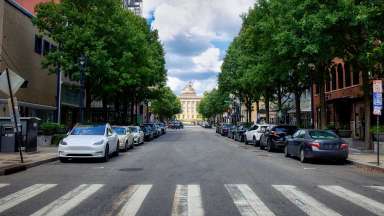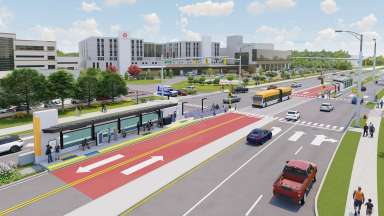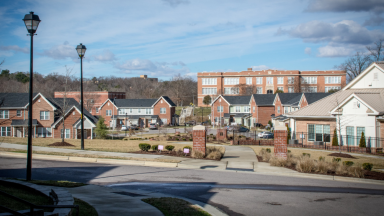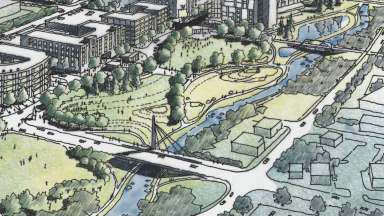Affordable Housing
Housing is affordable when a household spends no more than 30 percent of their income for housing costs like rent, mortgage, and utilities.
Affordable housing can be subsidized, meaning that it is funded in part by public or private non-profit dollars, or unsubsidized, meaning that it is naturally occurring in the market (often called "naturally occurring affordable housing" or "NOAH").
We think of the affordable housing landscape as a continuum that shows the range of affordable housing options available to residents:
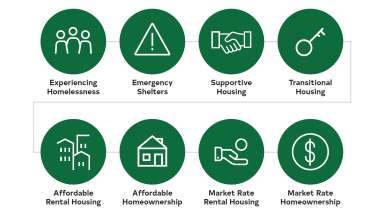
Area Median Income (AMI)
If you lined up every household in the Raleigh area in order from least to most income, the area median income (AMI) is the amount in the middle. AMI is used to determine eligibility for affordable housing programs. These programs are targeted to households earning below 80 percent AMI, with some programs intended for lower AMI levels.
Demolition
The act of removing an existing structure or building that may be dangerous or unsafe in order to clear a space for a new use. Demolition will usually be followed by environmental remediation before new use of the land or development can proceed.
Density
Density is the number of dwelling units (house, apartment, townhouse) that can be built on a certain amount of land.
Fee Simple Sale
The disposition of real property that involves the complete transfer of rights to the buyer, making the buyer the new owner of the land.
Ground Lease/Land Lease
A form of contract between an owner of real property and a tenant in which there is a transfer of rights (such as to access and improve) for an agreed upon price and term. The City of Raleigh will often leverage a ground lease in order to maintain ownership of its land, while allowing a tenant (such as a real estate developer) to build on the land.
Low-Income Housing Tax Credits (LIHTC)
LIHTC is a highly competitive Federal program administered by the states to invest in affordable housing by subsidizing the acquisition of land and construction/rehabilitation of units through financing. LIHTC is the most widely used tool to build affordable units, despite being tightly regulated and requiring state-specific development criteria.
Market-Rate Housing
Market-rate housing includes all housing options (rent or for sale) that are unsubsidized and do not have any obligation to serve a particular population. These projects will rent/sell at a competitive price and can therefore be profit-maximizing.
Mixed-Income Housing
Mixed-income housing includes a combination of market-rate housing units and Affordable Housing units restricted/reserved for households earning below the Area Median Income.
Mixed-Use
A mixed-use building or development includes a combination of two or more asset-types or uses, such as office, retail, and residential.
Multifamily Residential
A multifamily development contains two or more attached residential units. This could be a duplex, townhouses, condominium, or walk-up/mid-rise/high-rise apartment.
Open Space
Open space is natural land that does not have a building on it, such as a forest, greenway, park, wetland, floodplain, etc. Open space can be public or private.
Public-Private Partnerships
Public-private partnerships are mutually beneficial agreements between the City and the private sector (such as a private developer).
Redevelopment Process
Redevelopment process refers to the process of building or improving the value of real estate – from the initial planning, due diligence, financing, zoning, permitting, building, and leasing of a property.
Remediation
Often with urban development where new buildings are replacing existing structures or land uses, there is a need for environmental remediation. Remediation is a process of removing hazardous substances, treating contaminants, and containing pollution in the soil to ensure its safety for future use.
Request for Proposals (RFP)
The City of Raleigh will issue a Request for Proposal document to announce the DMV Development project, the City/Community goals, and to solicit bids from qualified developers.
Rezoning
Rezoning is the process to change the zoning district designation, or what can and cannot be built on a piece of land.
Zoning
Zoning is the act or process of partitioning a city, town, or borough into zones reserved for different purposes (such as residence or business) and is intended to promote an orderly pattern of development. Zoning ensures that the way land is used is compatible with the area. For example, proper zoning prevents an industrial building from being built in a neighborhood.
